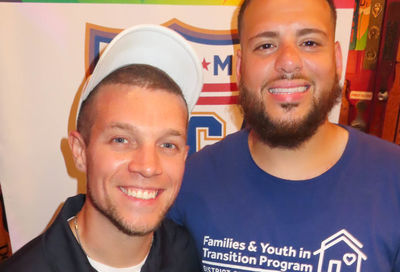School District Bans Dictionaries for Violating “Don’t Say Gay” Law
A Florida county removed dictionaries from library shelves to comply with the "Don't Say Gay" law's ban on "sexually explicit" material.

A Florida district removed several dictionaries from school library shelves over concerns that allowing students to access them would violate Florida’s “Don’t Say Gay” law.
In total, the Escambia County School District in the Florida Panhandle removed more than 2800 books from school, including the American Heritage Children’s Dictionary, Webster’s Dictionary for Students, and Merriam-Webster’s Elementary Dictionary, and placed them into storage, reports Popular Information.
The justification for the dictionary removals is that certain definitions or entries contained in the texts may violate “Don’t Say Gay,” the state’s “parental rights” law that prohibits students in grades K-12 from being exposed to LGBTQ-related content and “age-inappropriate” material.
Under the law, residents of any county are empowered to demand the removal of any library book that “depicts or describes sexual conduct,” as defined under Florida law, regardless of whether or not the book is pornographic.
Rather than consider individual complaints, the Escambia County School Board adopted an emergency rule last June that required the district’s librarians to review all library books and remove any works believed to contain such content.
Because most dictionaries contain in-depth definitions of sex and sexual anatomy and define LGBTQ terms like “gay” and “lesbian,” they were flagged for removal.
To purge the flagged books, school libraries in Escambia County were closed at the start of the school year. Each school’s librarian then filtered through approximately 15,000 to 30,000 books and removed any problematic titles.
Flagged works are currently being held for review, but the process is going slowly, with only 68 books reviewed thus far, according to a database compiled by the Florida Freedom to Read Project.
Even in the majority of cases, where the district decided to “keep” the books rather than place them in storage indefinitely, many of the challenged books, especially those designated for “young adults,” remain unavailable to students unless parents opt in to allow their children to check them out.
As reported by Popular Information, staff responsible for reviewing the challenged books were given a checklist to determine whether a book should be permanently removed from shelves.
The checklist suggests consulting “Book Looks,” a right-wing website listing various objections to books’ content and reasons why titles should be banned.
The website, created by Moms for Liberty member Emily Maikisch, has become extremely popular with right-wing groups seeking to restrict the availability of books that conservatives find objectionable.
In addition to dictionaries, Escambia County has removed eight encyclopedias, two thesauruses, and five editions of The Guinness Book of World Records.
Biographies of Beyoncé, Lady Gaga, Oprah Winfrey, Nicki Minaj, and Thurgood Marshall have been removed, as have 23 novels by Stephen King, and classics like Anne Frank’s Diary of a Young Girl, Toni Morrison’s Beloved, Sir Arthur Conan Doyle’s The Adventures and the Memoirs of Sherlock Holmes, and Margaret Atwood’s The Handmaid’s Tale.
Even right-wing texts, such as the Ayn Rand classic Atlas Shrugged and two books by conservative Bill O’Reilly, have not been safe from being flagged.
Florida Gov. Ron DeSantis claims that stories of books being banned or removed from library shelves are a “leftist activist hoax” and part of a “false political narrative.”
Florida Education Commissioner Manny Diaz says that removing “sexually explicit materials” does not constitute book banning.
But it is clear that many libraries, in attempting to abide by the “Don’t Say Gay” law, are overcompensating and removing any books that even hint at sex or LGBTQ content. As Popular Information notes, Escambia County is not the only district pursuing bans: Orange County, which includes Orlando, has removed at least 678 books from library shelves.
Escambia County currently faces a lawsuit from publishing house Penguin Random House, five authors whose books have been flagged for removal, two parents of students attending school in the district, and the anti-censorship nonprofit organization PEN America.
The state of Florida, which is backing the county, submitted an amicus brief in which Florida Attorney General Ashley Moody argued that banning LGBTQ books is equivalent to protecting children from “Nazi propaganda” and that the purpose of public school libraries is to “convey the government’s message” by removing books or messages that don’t conform with the government’s preferences.
Support Metro Weekly’s Journalism
These are challenging times for news organizations. And yet it’s crucial we stay active and provide vital resources and information to both our local readers and the world. So won’t you please take a moment and consider supporting Metro Weekly with a membership? For as little as $5 a month, you can help ensure Metro Weekly magazine and MetroWeekly.com remain free, viable resources as we provide the best, most diverse, culturally-resonant LGBTQ coverage in both the D.C. region and around the world. Memberships come with exclusive perks and discounts, your own personal digital delivery of each week’s magazine (and an archive), access to our Member's Lounge when it launches this fall, and exclusive members-only items like Metro Weekly Membership Mugs and Tote Bags! Check out all our membership levels here and please join us today!


























You must be logged in to post a comment.